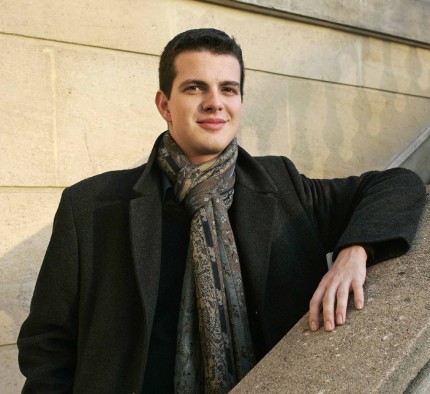Countertenor Jaroussky hits the heights in Chicago recital
Vocal recitals by sopranos, tenors and baritones are rare enough in Chicago these days. But a countertenor? Get real.
All credit then to the University of Chicago Presents series for serving vocal aficionados with the local debut of Philippe Jaroussky. The young French countertenor performed Friday night at Mandel Hall with the Venice Baroque Orchestra, the last stop on a six-city U.S. tour.
David Daniels is still singing well and often, but the next generation of countertenors appears to be a bountiful one. To the list of leading high-voiced male artists like Iestyn Davies and Anthony Roth Costanzo, one must now add Philippe Jaroussky.
The slender, 36-year-old singer possesses a pure choirboy-like timbre, fine technical acumen and striking agility. At times early in Friday’s program one would have liked to hear more varied tonal hues and a smoother legato. Yet by the evening’s end, he was spinning out long-lined arias with impressive breath control and nuanced coloring.
So too, Jaroussky seemed a bit stiff in his onstage demeanor, initially holding his arms out awkwardly in front, but after warming up appeared to grow more relaxed and less self-conscious.
Friday’s interesting program posited a kind of Baroque battle of the bands between Handel and Nicola Porpora, rivals in the 1730s, each writing operas that starred their respective surgically de-enhanced stars, Carestini and Farinelli.
This musical steel-cage match proved a bit one-sided with the showily empty brilliance of Porpora sounding rather slight next to Handel’s fecund melodic fount and emotional depth. Still, as shown on Jaroussky’s recent, excellent Erato disc of Porpora arias, the music is never less than entertaining and sometimes more than that, if not approaching Handel’s level of artistry.
Jaroussky led off with two Porpora arias that served as a worthy calling card. The young Frenchman sailed breezily through the coloratura display of “Mira in cielo” from Arianna e Teseo. There was some rapt and lovely soft singing in “Si pietoso il tuo labbro” from Semiramide riconosciuta though here his tone faded at the ends of phrases and his breaths fitfully broke up the vocal line.
By the time Jaroussky returned to Porpora at the program’s end he was clearly in the zone. From the slow gradual crescendo on the long opening note of “Alto Giove” from Polifemo, the handsome singer cast a spell with his hushed inward singing and bell-like tone. The infectious energy and coloratura fireworks of “Nell’attendere il mio bene” from the same opera was dazzling and rounded off the evening in flamboyant style.
Yet as impressive as Jaroussky’s advocacy for Porpora was, with better music to sing the countertenor was at his finest in Handel’s arias. His graceful vocalism in “Mi lusingha il dolce affetto” from Alcina was most affecting and eloquent, rendered with expressive freedom and a gorgeous cadenza as soft as eiderdown. “Sta nell’ircana” from the same opera was sadly undermined by some abysmal horn playing.
Jaroussky dashed off the pyrotechnics in “Agitato da fiere tempeste” from Oreste with technque to burn, but it was “Scherza infida” from Ariodante that provided the highlight of the evening—spacious, interior and sung with a depth of feeling that reduced the oft-restive Mandel Hall audience to silence.
The rapturous ovations brought the collegial singer out for a single encore: “Sposa son disprezzata” from Vivaldi’s opera Bajazet, sung with a tender yearning that seemed just the right coda to the evening.
The Venice Baroque Orchestra is a worthy ensemble and accompanied their soloist alertly, sans conductor. Apart from the persistently wayward horns, the playing of the period-instrument band was rhythmically agile and bristlingly energized, if at times more rambunctious than polished.
Still, the ensemble brought tonal delicacy and wide dynamic contrasts to two Handel Concerti grosso (in A minor and G major, Op. 6, nos. 4 and 1). The astringent period timbres lent bite and the excellent theorbo player provided subtle textural touches. The playing was nothing if not committed and it was fun to watch the Italian players’ performing intensity, the first cellist practically leaping off his chair.
